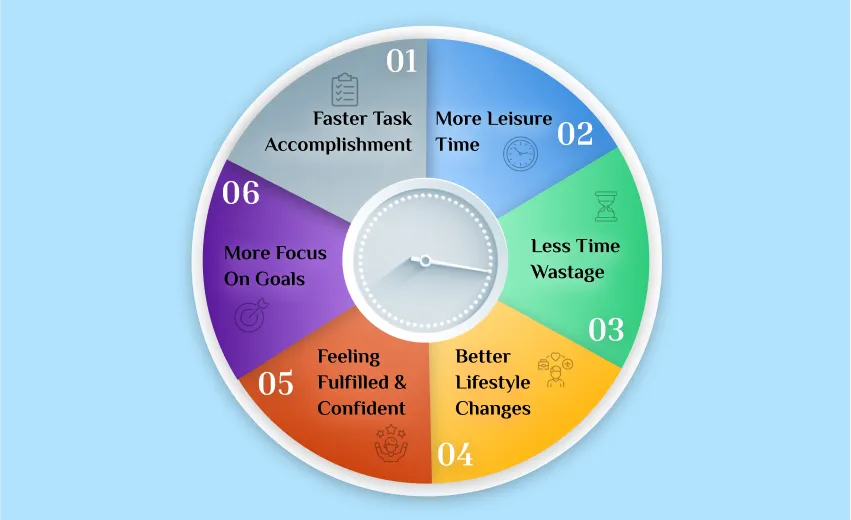Time management is one of the most important skills students can learn. Effective time management can lead to improved productivity, reduced stress, and more time for personal activities. However, balancing study, assignments, extracurricular activities, and social life can often seem overwhelming. By implementing some simple but effective time management strategies, students can manage their time more efficiently and achieve academic success while maintaining a healthy work-life balance.
In this article, we will discuss some practical and easy-to-follow time management tips for students.
1. Set Clear and Achievable Goals
The first step in effective time management is setting clear and achievable goals. Without specific goals, it’s easy to feel directionless and waste time on tasks that don’t contribute to your long-term objectives.
- Why: Clear goals give you focus and help prioritize tasks, making it easier to decide where to allocate your time.
- How to Do It: Break down larger goals into smaller, more manageable tasks. For example, instead of just saying “study for the exam,” set specific goals like “review chapter 3 notes” or “complete practice problems for 30 minutes.”
- Pro Tip: Use the SMART criteria (Specific, Measurable, Achievable, Relevant, Time-bound) to define your goals, which makes them easier to track and accomplish.
2. Create a Schedule or To-Do List
One of the best ways to stay organized is by creating a schedule or to-do list.
- Why: A schedule or list helps you keep track of deadlines, assignments, and activities, so you don’t miss anything important. It also prevents procrastination by breaking tasks down into smaller steps.
- How to Do It: Use a physical planner, a calendar app, or a to-do list app to plan your day or week. Include class schedules, study times, and extracurricular activities, along with personal commitments.
- Pro Tip: Color-code different activities (e.g., blue for school, green for personal, red for urgent) to visually organize your time.
Bonus: Reviewing your schedule or to-do list at the end of the day helps you track progress and make adjustments for the next day.
3. Prioritize Tasks
Not all tasks are created equal, and prioritizing them is essential to effective time management.
- Why: By prioritizing your tasks, you ensure that you focus on what is most important or time-sensitive first.
- How to Do It: Use the Eisenhower Matrix, a tool for prioritizing tasks based on urgency and importance. Tasks can be classified as:
- Urgent and Important (must do right away)
- Important but Not Urgent (schedule to do later)
- Urgent but Not Important (delegate if possible)
- Neither Urgent Nor Important (eliminate or postpone)
- Pro Tip: Start your day by tackling the most important tasks. This way, you can focus on high-priority work when your energy levels are at their peak.
4. Avoid Procrastination
Procrastination is one of the biggest time-wasters for students. It can result in missed deadlines, unnecessary stress, and subpar work.
- Why: Procrastination prevents you from completing tasks on time and can create a cycle of stress and anxiety.
- How to Do It: Break large tasks into smaller, manageable chunks to avoid feeling overwhelmed. Also, set time limits for tasks to create a sense of urgency.
- Pro Tip: Use the Pomodoro technique, which involves working in 25-minute focused intervals followed by a 5-minute break. This helps maintain concentration and combats procrastination.
Bonus: If you’re struggling to start a task, commit to working on it for just 5 minutes. Often, getting started is the hardest part, and once you begin, you’ll find it easier to continue.
5. Minimize Distractions
Distractions can significantly impact your productivity and time management.
- Why: Distractions, whether from social media, notifications, or noise, break your focus and waste precious study time.
- How to Do It: Identify common distractions in your environment and take steps to minimize them. For example, turn off notifications on your phone, study in a quiet space, or use apps that block distracting websites while you work.
- Pro Tip: Use headphones or noise-canceling headphones to block out background noise, which can improve your focus and concentration.
6. Use Time Blocking
Time blocking is a technique where you assign specific blocks of time to different tasks or activities.
- Why: Time blocking helps you stay on track by providing a structure to your day and ensuring that you devote enough time to each task.
- How to Do It: Set aside specific time periods for studying, classes, meals, breaks, and even personal activities. For example, you might block off 9 AM–11 AM for studying math and 2 PM–3 PM for attending a club meeting.
- Pro Tip: Be realistic about how much time tasks will take and allow some flexibility for unexpected events.
Bonus: Include buffer time between tasks to prevent overlap and avoid feeling rushed.
7. Take Regular Breaks
While it may seem counterintuitive, taking regular breaks can actually improve productivity and focus.
- Why: Taking breaks helps prevent burnout, recharges your energy, and allows your brain to process information.
- How to Do It: Follow techniques like the Pomodoro method, where you work for 25 minutes and take a 5-minute break. After every four Pomodoro sessions, take a longer break (15-30 minutes).
- Pro Tip: Use your breaks to stretch, take a walk, hydrate, or simply relax to refresh your mind and body.
8. Stay Organized
An organized workspace and digital environment can make a significant difference in how efficiently you manage your time.
- Why: Cluttered spaces and disorganized files can cause stress, waste time searching for materials, and hinder your ability to focus.
- How to Do It: Keep your study area tidy by organizing books, notes, and other materials. Use folders or digital tools like Google Drive or Evernote to keep track of documents.
- Pro Tip: Set aside 5-10 minutes at the end of each study session to tidy up your workspace. This way, you’ll start each session with a clean slate.
9. Stay Healthy
Good physical health supports mental clarity and productivity.
- Why: Poor physical health, including lack of sleep, poor diet, and lack of exercise, can lead to fatigue, reduced focus, and increased stress.
- How to Do It: Maintain a balanced diet, get regular exercise, and prioritize sleep. Aim for at least 7-8 hours of sleep per night, eat nutrient-dense foods, and incorporate physical activity into your daily routine.
- Pro Tip: Even small changes, like taking the stairs instead of the elevator or eating a healthy snack, can make a big difference over time.
10. Learn to Say No
Sometimes, students overcommit to activities and projects because they find it hard to say no.
- Why: Overcommitting can lead to burnout, poor performance, and increased stress levels.
- How to Do It: Be mindful of your limits and prioritize tasks that align with your goals. If something doesn’t contribute to your well-being or academic success, it’s okay to politely decline.
- Pro Tip: Practice saying no in a respectful way, such as, “Thank you for the opportunity, but I’m unable to participate due to my current commitments.”
Conclusion
Time management is a crucial skill for students to develop in order to succeed academically and maintain a healthy balance between work, study, and personal life. By setting clear goals, creating a structured schedule, minimizing distractions, and staying organized, students can make the most of their time and reduce stress. Remember, time management is a continuous process, and it’s okay to adjust strategies as you discover what works best for you. Start implementing these tips today, and watch your productivity and well-being improve.




